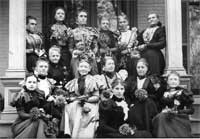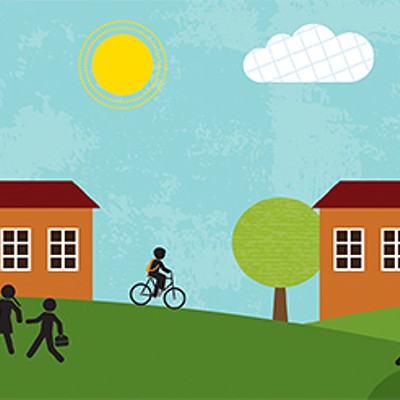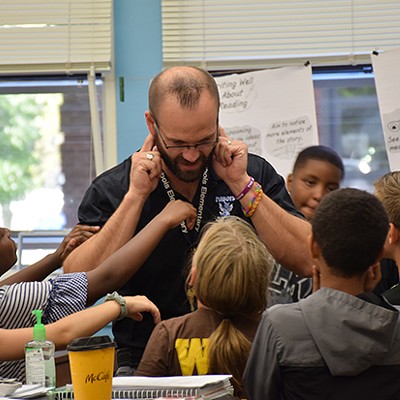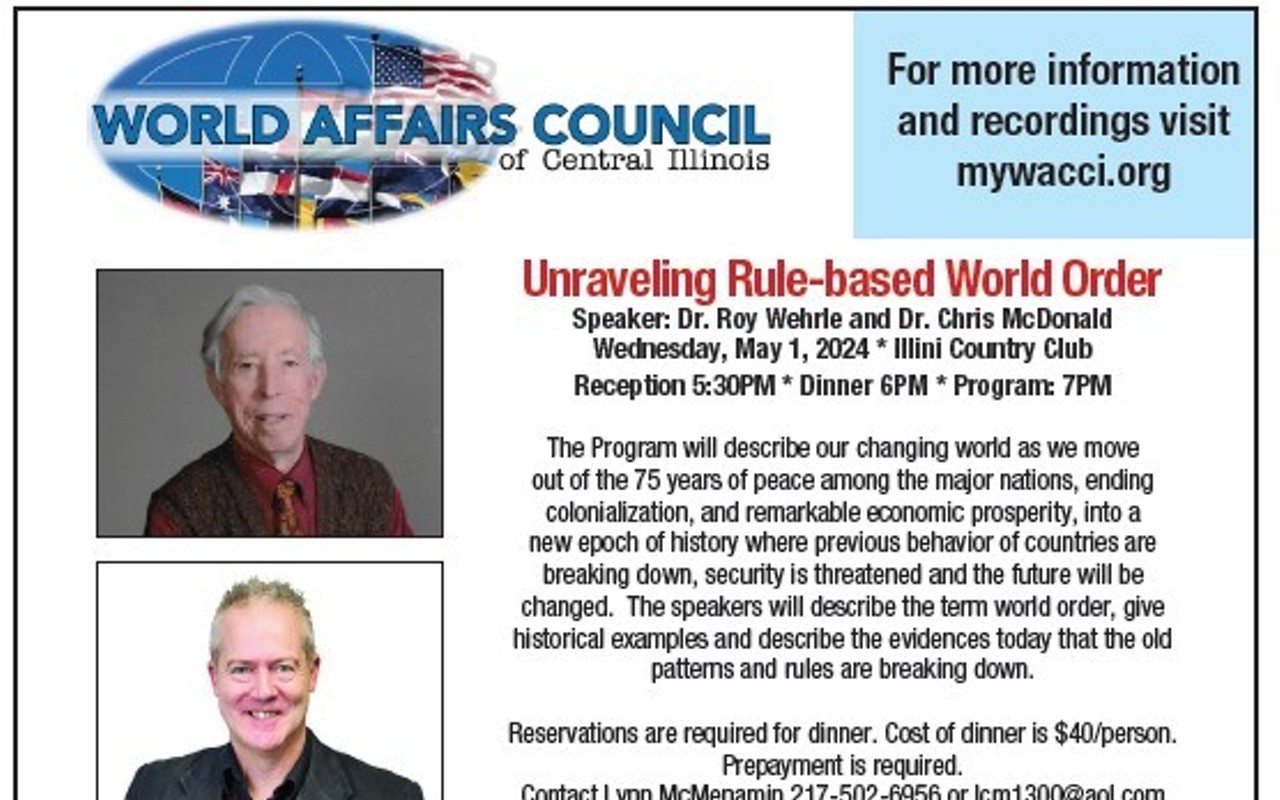Literary clubs, in a sense, have been around since Socrates and Plato convened their many intellectual discussion sessions. The British coffeehouses of the 18th century, where men met to discuss all aspects of politics and religion, continued the tradition. In the 1830s, Margaret Fuller, a friend of Transcendentalists Ralph Waldo Emerson and Henry David Thoreau, created her weekly women’s conversations, considered the first women’s clubs in America. And we shouldn’t forget the French salons of the 19th century or the writers such as Gertrude Stein and Ernest Hemingway who met at outdoor cafés in 20th-century Paris to discuss literature and life.
In Chicago, literary clubs sprang up during the 1800s to discuss politics and labor issues. Some of the early Chicago clubs included the Chicago Lyceum (1841) and the Chicago Literary Club (1874).
Festivals called Chautauquas, named for the site of the first summer event at Chautauqua Lake, N.Y., in 1874, promoted the arts, literary readings, oratories, debates, and scholarly pursuits. Chautauquas soon were popping up around the country. Several central-Illinois towns, such as Petersburg, Decatur, and Danville, hosted these gatherings.
So literary clubs have been around for centuries, and here in central Illinois — in both the capital city and nearby Jacksonville — the tradition continues today with serious pursuits of intellectual dialogue and scholarship.
The clubs are proof that reading and research are alive and well and that many of our citizens still seek intellectual stimulation in scholarly pursuits and discussion.
Education in Jacksonville is
paramount, no doubt in part because of the presence of Illinois
College and MacMurray College, and the community, as a whole, has
embraced learning and self-improvement.
At IC, students do not join fraternities and sororities but, rather, Greek-named literary societies that promote community involvement, debate, oration, essay writing, readings, speeches, and social activities. On campus there are seven in all, three for women and four for men; throughout the town, there are two men’s and five women’s literary clubs. All have existed since the mid-1800s.
The male professors connected with IC and MacMurray also formed literary clubs that still are active, although today members now come from all walks of life, not just the academic world of higher education. One, the Club, has been in existence since 1861 and the other, the Literary Union, since 1864.
Rand Burnette, a retired MacMurray history professor, has been a member of the Literary Union since 1968. Another prominent member is former U.S. Rep. Paul Findley. Both the Literary Union and the Club limit membership to 25 people and meet the second and fourth Mondays of each month.
Members of both clubs choose the topics of their presentations to the rest of the group.
“This can be a scholarly research on any topic of one’s choosing, a book review, or even a book critique,” Burnette says. “Usually the presentation lasts 30 to 40 minutes. Then each person is given time to comment, ending with additional comments by the presenter.”
Some recent Literary Union presentations have covered stem-cell research, investing, animation, the U.S. Constitution, Martin Luther, the Jesuits, and PalmPilots.
“One member prepared a 45-minute first-person narrative based on a 70-page memoir of a Union Army soldier who had been in Andersonville prison, where he became paralyzed,” Burnette says. “The presentation was powerful.”
Illinois College professor W.D. Sanders founded the Club; the college’s founder and president, Julian M. Sturtevant, was among the first members.
Early discussion topics delved into issues that were pertinent to people of the Civil War era; for example, one of the Club’s earliest presentations, by Sturtevant, was titled “What Should be the Immediate Policy of the Government with Regard to the Slave Problem?” In 1865, the educational system became a topic of concern, with one paper titled “Common School Education, and What Modification of Our Present System is Desirable?” — a topic still debated today.
Food was plentiful, and the secretaries carefully documented what was served. One especially artful secretary from 1957 wrote about the food prepared by home-economics teacher Mrs. Arthyr Hellerberg: “Food came to man tonight, and kept on coming. Rolls and sweet rolls, chocolate and hot chocolate, and other good things beggar description of either their variety or their savoriness. Chaucer would have said, ‘Weel weren essed atte beste,’ and Mark Twain would have said, ‘It’s an elegant feed,’ and Dr. Johnson would have said, ‘It was a dinner to ask a man to.’”
Asked what has changed over his years in the literary society, Burnette says, “We meet less often in homes — a good-sized room is needed, and people live in smaller homes these days. Also, we used to smoke cigars. And, more men miss meetings for various reasons; in the past, one just did not miss a meeting.”
Jacksonville’s five women’s literary clubs include Sorosis (founded in 1868), whose name is derived from “soro,” Latin for “sister”; Wednesday Class (1887), named for the afternoon of the week on which the group meets for a program and tea; College Hill (1888), named for the hill on which Illinois College sits; Monday Conversation (1888), again named for the night of the week on which the group meets; and History Class (1896), named for the founding group’s main focus on history.
Each club each has a membership of 20 to 25; members choose a theme for the year, and each person prepares a presentation around that theme.
Sorosis was at first an extension of a New York club; History Class was an extension of the University of Chicago’s literary club, which distributed study guides during the early years.
Some of the themes in recent years have included “Understanding Other Cultures and Our Own Through the Arts” (Sorosis); “Banned, Burned, and Challenged Books” and “The Armchair Traveler” (Wednesday Class); “Women of Words” and “Power Women” (History Class); “Women in Art” and “I Come to the Garden” (College Hill).
Although not a literary club, another group in Jacksonville should be recognized. The Ladies Education Society, founded in 1833, is the oldest ladies’ society in the United States, according to member Emily Osburn; its goal is to give scholarship money to women pursuing college educations. Strictly funded through an endowment, the group meets two times a year to “give away money,” Osburn says.
“We are proud of being the oldest group
in the U.S., and it is nice to be able to help worthy women in
their education.”
In Springfield, women’s literary clubs started in 1878 with a group called the Shakespeare Club, founded by Mrs. John C. Lanphier, a member of one of the city’s leading families. This group studied just one topic — Shakespeare — for its first 10 years, then branched out into others.
Two other still-active Springfield women’s literary clubs each have a rich history, and the early membership rolls include some of the city’s most prominent names, including Herndon, Logan, Oxtoby, Bunn, Dickerman, Matheny, Lindsay, and Crook.
Sunnyside was founded in November 1887, when Mrs. H.S. Dickerman convened a group of women at her home to discuss American literature. They spent the first year studying Washington Irving, author of such classics as The Legend of Sleepy Hollow and Rip Van Winkle. Mrs. Vachel Lindsay was once a member of Sunnyside.
Today, as then, Sunnyside meets twice a month, September-May. Each year, the group chooses a topic and then each member prepares a well-researched, well-written paper and makes an hour-long presentation.
Choosing the topic for the year is serious work. Two people prepare a list of a broad range of topics and then, over the course of several meetings, the group narrows its focus and selects the topic. Last year, the group studied mythology. This year, the theme is “Coming of Age” through the eyes of great American authors.
Sunnyside gets its name from Washington Irving’s home in Tarrytown, N.Y., a sprawling, turreted mansion next to the Hudson River. In celebration of the group’s 100th anniversary, the members took a trip to the home in 1997.
The Anti-Rust Club, the other still-active Springfield literary club, meets October-April on a total of 25 Thursdays. It takes its name from a line of a Robert Browning poem: “Just so much work as keeps the brain from rust/Just so much play as lets the heart expand.”
The Anti-Rust Club was started by Katherine Dresser White in 1894. According to member Nancy Chapin, members were often daughters and daughters-in-law of the founding members. Chapin says the club went through attendance problems in the 1920s, resulting in new rules that allowed any member who would be absent for more than six meetings to designate a guest to fill in. That way, the members who had prepared lengthy, scholarly papers would be ensured of an audience to hear the research they had so painstakingly produced.
Just like Sunnyside, the Anti-Rust Club picks a topic for the year, and then each member prepares a paper. Last year’s topic was the culture of the 1940s, and presentations covered World War II photography, big bands, architecture, radio, film, Broadway musicials, and regional fiction.
Both Anti-Rust and Sunnyside have kept program booklets going back to their inception; these are housed as part of the Sangamon Valley Collection at Lincoln Library.




















